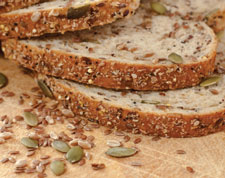Big benefits of little sprouts
by Leika Suzumura, R.D., former PCC Nutrition Educator
This article was originally published in March 2011

Inside every seed is a mystery that lies dormant — until the perfect conditions allow it to sprout new life.
Sprouted seeds, or sprouts, contain nutritional benefits unique to their tender new growth. Cultures around the world feature different sprouted seeds and grains as part of their traditional cuisine. And in recent years, more sprouted products have found their way onto PCC’s shelves, from sprouted corn tortillas to sprouted breads to cereal made with sprouted grains.
A significant change occurs with sprouted grains and seeds that unleashes nutritional benefits. When seeds are exposed to water they begin the process of germination. This activates enzymes that begin breaking down the starches within the seed into simple sugars to provide energy for the growing seedling. This also breaks down fats and proteins to their simple forms and provides easier digestion and absorption — plus a fresh, intense, sometimes nutty, taste.
In the case of sprouted wheat breads, the starches become “pre-digested,” making it easier to eat for those who have digestive sensitivities. For those who are unable to eat gluten, however, the process of sprouting does not eliminate the gluten source, making sprouted wheat breads unsuitable for a gluten-free diet.
For those able to tolerate gluten, research indicates that certain nutrients, including B vitamins and protein, are more readily available to the body after the wheat has been sprouted, providing easier access to the nutrition packed within each kernel.
References
Alvarez Venegas R., Castellanos Molina R., Martínez Bustos F., Cruz Mondragón C. Centro de Investigación y Estudios Avanzados del Instituto Politécnico Nacional, Departamento de Biotecnología y Bioingeniería. México. “Antiphysiological and nutritional factor changes in sorghum (Sorghum bicolor (L.) Moench seeds) during germination.” Arch Latinoam Nutr. 1997 Jun;47(2):136-40.
